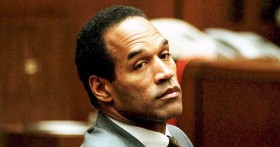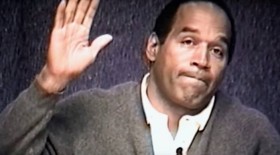Kollega Tue Steen Müller spørger mig, hvorfor jeg bliver ved med at se serien om O. J. Simpson, selvom jeg var skeptisk efter første afsnit, som vi så sammen… Jamen, netop det spørgsmål har jeg stillet mig selv efter DR2 visningen i aftes (jeg så dog kun sidste 2/3 og har ikke set de mellemliggende, men vil prøve at gøre det) og siden er jeg begyndt forsøgsvis at læse de begejstrede anmeldelser. Kan jeg finde en forklaring der? Eller er det klipningen? Biljagten i afsnittet i aftes for eksempel? Jeg har ikke været så optaget af en amerikansk arkivfilm siden måske Barak Goodmans serie “Clinton” eller endnu mere præcist siden Emile de Antonios “Millhouse” som end ikke er sentimental hvad Clintonbiografien er. Må prøve at finde kræfter til at se og finde en forklaring…
USA 2016, 463 mins
Seriens længde er således en udfordring. “… Its length may seem daunting, but I would have watched it for another eight hours and will almost certainly watch it again before the summer is over. It’s that good”, skriver imidlertid Brian Tallerico i sin grundige og kloge anmeldelse på rogerebert.com:
http://www.rogerebert.com/reviews/oj-made-in-america-2016
HVID FORD
Det var biljagten i afsnit 3 jeg kom fra. Nu er det snart tirsdag igen og jeg er ganske enkelt spændt på afsnit 4, jeg må uomgængeligt være med i det her. Jeg, som ikke er trofast tv-seer…
Jeg, som sjældent følger serier, jeg fulgte sidste tirsdag den forfølgelse af den hvide Bronco som filmen skildrer i actionæstetik, men i en ganske enestående actionæstetik ved at blive ved helikopteroptagelserne af Broncoens kørsel og kun ganske kort, på en måde opmuntrende, lave klip til optagelser fra jorden og, næsten uvirkeligt, til den beruset begejstrede journalists kommentarer fra en dyb lænestol, en besynderlig karakter, som nu ser sine optagelser fra deroppe i sin tv-stations helikopter dengang de var virkelige, nu ser dem som film til tv. Og med dette klippevalg gør Edelman mig til egentlig deltager i dramaet. Når dette menneske i lænestolen både er reporteren og den fnisende leende tilskuer til sit scoop, lægger jeg uden beslutning afstand betragtningerne udefra og flytter mig selv ind i Broncoens værdige ro, jeg holder nu med flygtningen. I hvert fald lige nu i dette: flugten. Og Edelmans fortælling forstår mig og følger med mig, skildrer de mange tilskuere til jagten, som ikke er en jagt, men en eskorte viser det sig, for politiet vil ikke miste OJ, de beskytter deres Juice, hans øgenavn fra fodboldbanen bruges nu mere og mere, og den hvide Bronco baner sig netop som den nærmer sig Simpsons hjem, vej gennem mylderet som cykelheltene højest i bjergetaperne. Jeg holder således med fodboldhelten her i løbet tilbage til baglinjen, holder med Juice, som med, viser det sig her, ikke bolden, men de vigtige indrammede fotografier i favnen…
Brian Tallerico skriver: “… These kind of “you are there” details are riveting, but that’s not meant to imply that this is merely a compendium of little-known facts. What really separates “OJ: Made in America,” other than its investigative spirit, is the brilliant connections Edelman and his team make through editing. We hear a fascinating story about friends trying to play a prank on a young OJ Simpson and Al “AC” Cowlings in which they pulled a starter pistol and AC jumped to protect his best friend. Of course, cut to the Bronco chase, in which AC could have been the last man to see OJ alive if Simpson had done what he intended at several points that day.

RUNNING BACK
Jeg var skeptisk ved afsnit 1 skrev kollega Tue Steen Müller, det mærkede han, da vi så den sammen. En læser af vores Facebookside indvendte, at det afsnit jo indeholdt en fremragende redegørelse for udviklingen i det spændte forhold mellem den sorte og den hvide befolkning disse år, og ja, det så jeg ved gensynet, det da er rigtigt nok, og vigtigt ja. Men jeg ledte efter noget andet, en kerne i serien og kom nu lidt på sporet af den, for med ét forstod jeg biljagten i afsnit 3. Jeg så nelig nu, at det centrale motiv i afsnit 1 er OJ’s løb med bolden, hans løb fra alle andre, hans af alle beundrede løb til baglinjen med bolden i favnen. Jeg undrede mig ved første gennemsyn over dette uendeligt gentagne motiv. Det er jo ikke en almindelig sportsreportage, heller ikke kun en biografisk redegørelse, nej arkivoptagelserne er klippet i rytmiske sekvenser til noget særegent. Denne detalje er vigtig for mig, vigtig nærmest musikalsk, og det gik så op for mig, at der er en lang bue af forståelse fra løbet med bolden til flugten med fotografierne i den hvide bil i 3. afsnit. Sådan noget kan jeg lide i en filmiske fortællelinje, lange buer mellem dens kernetemaers enkeltelementer, der er Edelmans sindrige værk naturligvis adskillige… Sådan kollega, dette er mit foreløbige svar.

ANSIGTSUDTRYK
Dette billede er cinematografisk det vigtigste, det helt centrale i 4. afsnit, hvor dobbeltmordet skildres, hvor anklagerholdet og forsvarerholdet krydsforhører vidner og argumenterer mod hinanden. Dette billede af anklagede O. J. Simpson i retten lyttende (en enkelt gang handlende da han prøver handskerne), lyttende og afmålt reagerende, men vist uden at have en eneste replik. Det er nemlig noget helt andet Edelman vil med sine utallige indklip af denne indstilling, denne ene indstilling med lige så utallige variationer i det overmåde store arkivmateriale, variationer i hovedpersonens repertoire i fuldt kontrollerede ansigtsudtryk. I klipningen afprøves med den kameraindstilling en enkelt bemærkning af statsadvokaten, nu år efter som vidne i filmen her: Simpson kan på et splitsekund (og hun knipser i luften med to fingre) skifte ansigt fra én følelsens yderposition til en anden. Uventet. Nu råder klipperen så over disse utallige kombinationsmuligheder med et ligeledes, må det være, meget stort antal udsagn fra advokater og vidner og lydbånd og dertil fremlagt bevismateriale og fotografier med et rystende indhold. I dette klippebordets variationsværk fører Ezra Edelman sideløbende med sin samfundsskildring af det vestlige USA dette årti, skildringen af sin hovedperson så underfundig kryptisk videre, at i hvert fald jeg alene for dette klippearbejde må se ikke blot serien færdig, men inden da 4. afsnit igen…

GENTAGELSE
Som i mange satsdelte musikværker er tv-seriens sidste afsnit en stor billedfuga, hvis en sådan kan tænkes, en, føles det, rolig og selvfølgelig gentagelse af motiver og greb, jeg gennem de første dele er blevet fortrolig med ved gentagelserne der. Derfor er det selvfølgeligt, at O. J. Simpson kan køre direkte fra frifindelsen i retsalen og hjem. I den bil jeg nu kender mere end nogen. Trygheden er denne hvide Ford Bronco. Den er den flugtbil som er beskyttet af publikum og myndigheder.
Tv-seriens sidste afsnit begynder med en skildring af juryens afgørelse, en alvorlig undersøgelse af baggrunden for, at den trods det meget lange retsforløb kommer efter en votering på kun få timer den første formiddag, og så er det netop derfor: juryen er kørt træt, hvert enkelt medlem vil hjem hurtigst muligt efter mange ugers isolation. Afsnittets højdepunkt er for mig ikke J. O. Simpsons reaktion skildret i optagelser af ham stående i gruppen af forsvarere, for den er ventet, den er en gentagelse af scener jeg kender fra 4. afsnit. Den er selvfølgelig og den udskyder højdepunktet, som kommer lige efter. Det er Edelmans og klipperens montage af en balanceret række af ensartede nærbilleder af tilhøreres reaktion, et storslået studie i ansigter i følelsers ukontrollerede udtryk, altså en gentagelse og en variation af montagen af optagelser af Simpsons kontrollerede ansigtsudtryk i en tilsvarende sekvens i 4. afsnit, som den forbinder sig til i en erindringsbue over scenen med ham stående i skranken lige før, knyttende hænderne diskret, men dog tydeligt som det i dette øjeblik sejrende konkurrencemenneske.
Den følgende sekvens er en varieret gentagelse af flugtmotivet, løbet tilbage til baglinjen med bolden, med fotografierne, med minderne i favnen, nu i den hvide Bronco, nu på vej hjem i en montage atter med gentagelsens erindringsbuer over en række scener i tidligere afsnit til bilen i en helikopteroptagelse i en beskæring, jeg har set før, men ikke den samme, nej, omhyggeligt ny og fundet af klipperen, kører gennem de to portstolpers åbning af opkørslen til Simpsons villa.
Men der bag linjen er holdet opløst, splittet. Bolden, minderne, billederne bliver stjålet, hans egne evner svigter. Og nu kommer gentagelserne i tragediens følgende akter, to nye retssager, en civilretssag og strafferetssag, begge uden nogen storhed overhovedet, uden stjernespillere, uden det store stadions opmærksomhed. Filmen er en tragedie, men den er ikke de to myrdedes tragedie, den er O. J. Simpsons tragedie, tv-serien er samlet en tragedie i den store klassiske stil om et meneskes skæbne, dette menneskes skæbne.
Titlen fortæller at dette menneske er produkt af samfundet det lever i. Sætter mennesket sig op og skiller sig ud og hævder sig og nærmer sig guderne, ja så er det overmod, det er hybris, og det indebærer en straf, som er blinde lystne guders hævn og leg. Deres leg hedder gentagelse. Og jeg bliver i min læsning af Ezra Edelmans værk ved dette still fra en scene fra den sidste retssag. Træt hæver O.J. Simpson hånden og sværger at sige sandheden, hele sandheden og kun sandheden. Jeg ved det er forgæves.

USA 2016, serie i fem afsnit på i alt 463 mins. Anmeldelse, review: 6/6.
Det sidste afsnit sendte DR2 Dokumania 9. august 2016. Alle afsnit kan ses på
https://www.dr.dk/tv/programmer/genre/dokumentar






